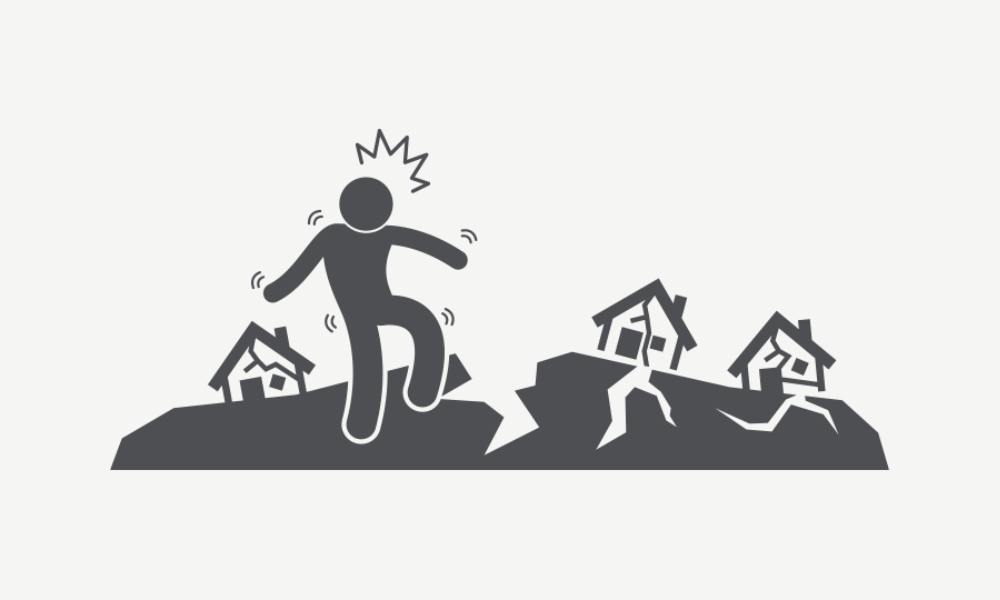
- EconomyPortals
- 11 Sep, 2023
Earthquakes are natural disasters that can strike suddenly and with devastating force, causing destruction and posing significant risks to human life and property. Being prepared for an earthquake is essential to minimize its impact and ensure your safety. In this blog, we will guide you through the steps to take before, during, and after an earthquake to protect yourself and your loved ones.
Before an Earthquake
-
Create an Emergency Kit: Prepare an emergency kit that includes essential supplies such as non-perishable food, water, a flashlight, batteries, a first-aid kit, a multi-tool, and any necessary medications. Make sure to customize it to your family's needs.
- Develop an Emergency Plan: Establish a family emergency plan that outlines meeting points, communication methods, and responsibilities. Ensure everyone in your household knows the plan and practices it through regular drills.
- Secure Your Home: Bolt heavy furniture to walls and secure breakable items. Identify safe spots in your home, such as under a sturdy table or desk, where you can take cover during an earthquake.
- Know Your Utility Shut-Offs: Familiarize yourself with the location of your home's gas, water, and electricity shut-off valves. Learn how to turn them off safely to prevent leaks or fires.
- Educate Yourself: Learn about earthquake safety measures and what to do during an earthquake. Stay informed by following local news and emergency alerts.
During an Earthquake
-
Drop, Cover, and Hold On: If you are indoors, drop to the ground, take cover under a sturdy piece of furniture, and hold on until the shaking stops. Protect your head and neck.
-
Stay Indoors: Avoid running outside during the shaking, as falling debris and glass pose significant dangers. If you are already outside, find an open area away from buildings, trees, and power lines.
- Stay Away from Windows: Glass windows can shatter during an earthquake. Keep a safe distance to avoid injury.
- If You Are Driving: Pull over to a safe spot away from buildings, bridges, and overpasses. Remain in your vehicle with your seatbelt fastened until the shaking stops.
- If You Are in Bed: Stay there and cover your head with a pillow. Do not rush to exit the building.
After an Earthquake
-
Check for Injuries: Carefully assess yourself and those around you for injuries. Administer first aid as necessary.
- Assess Your Surroundings: Check for hazards, such as gas leaks or electrical fires. If you smell gas or suspect a leak, turn off the gas supply immediately and leave the building.
- Listen to Local Authorities: Stay informed about ongoing aftershocks and follow instructions from local emergency services.
- Contact Loved Ones: Use text messages or social media to let friends and family know you are safe. Phone lines may be congested during an emergency.
- Inspect Your Home: After ensuring your safety, evaluate your home for structural damage and, if necessary, contact professionals for repairs.
- Continue Monitoring: Aftershocks can follow a major earthquake, so remain vigilant for additional shaking.
Before an Earthquake
During an Earthquake
- Stay Calm: Keep your composure during the quake. Panic can lead to poor decision-making and increase the risk of injury.
- Hold On to Cover: If you are taking cover under furniture, hold on tightly to maintain protection. Brace yourself to prevent being moved by the shaking.
- Listen to Emergency Broadcasts: If possible, tune in to a battery-powered or hand-crank radio for updates and instructions from local authorities.

After an Earthquake
- Help Others: Check on your neighbors, especially those who are elderly, disabled, or have young children. Offer assistance if it's safe to do so.
- Avoid Using Elevators: Elevators may be damaged during an earthquake and should not be used until they are inspected and declared safe.
- Document Damage: Take photos or videos of any damage to your property and possessions. This documentation will be crucial for insurance claims and disaster assistance applications.
- Temporary Shelter: If your home is deemed unsafe, seek shelter with friends, family, or at a designated emergency shelter. Remember to bring your emergency kit and important documents.
- Replenish Supplies: As soon as it's safe, restock your emergency kit with food, water, and other supplies to ensure you're prepared for potential aftershocks or extended disruptions.
- Seek Professional Help: If you suspect structural damage to your home or gas leaks, contact appropriate professionals, such as building inspectors or utility companies, for assessments and repairs.
- Emotional Support: Earthquakes can be traumatic. Don't hesitate to seek emotional support from friends, family, or mental health professionals if needed.
Conclusion
Earthquakes are unpredictable natural disasters, but by taking proactive steps to prepare yourself and your family, you can significantly reduce the risks associated with them.
Remember to stay informed, practice your emergency plan, and remain vigilant even after the initial quake. Being earthquake-ready is essential for your safety and peace of mind.
